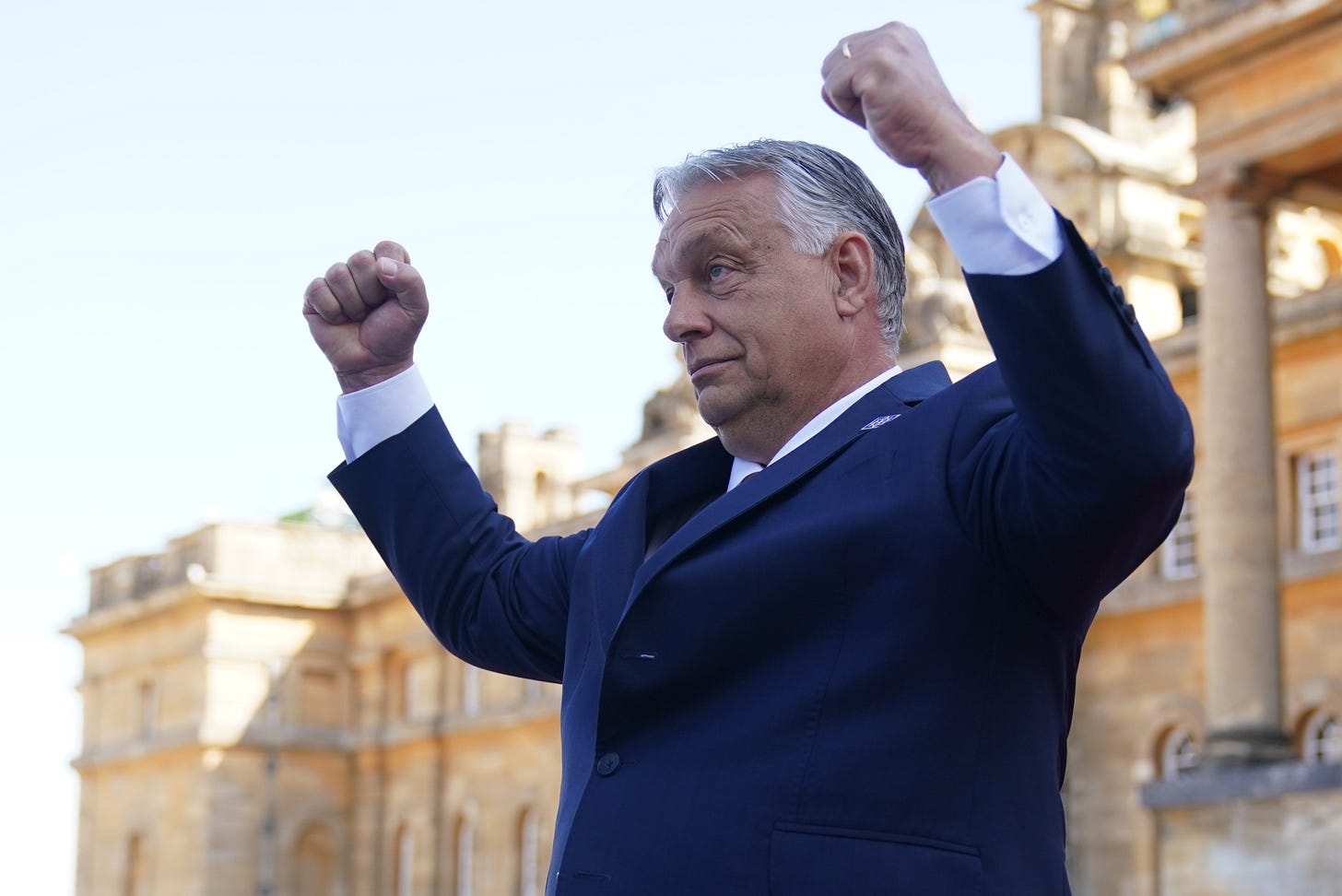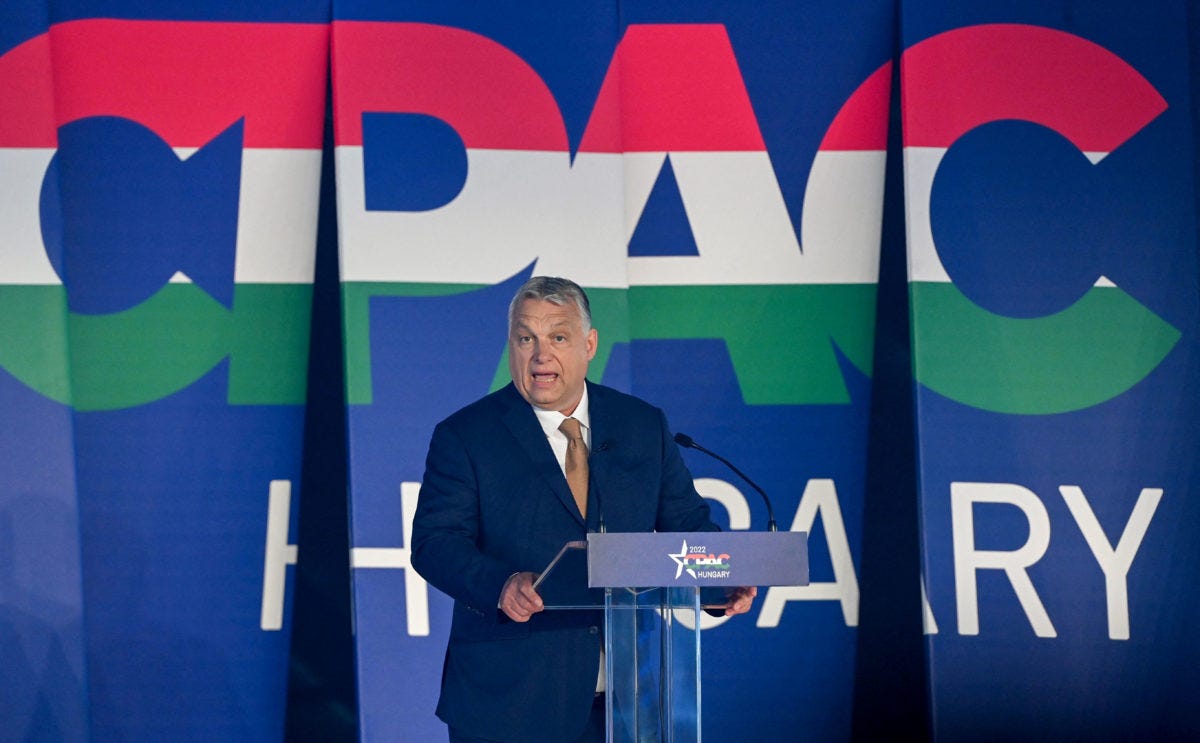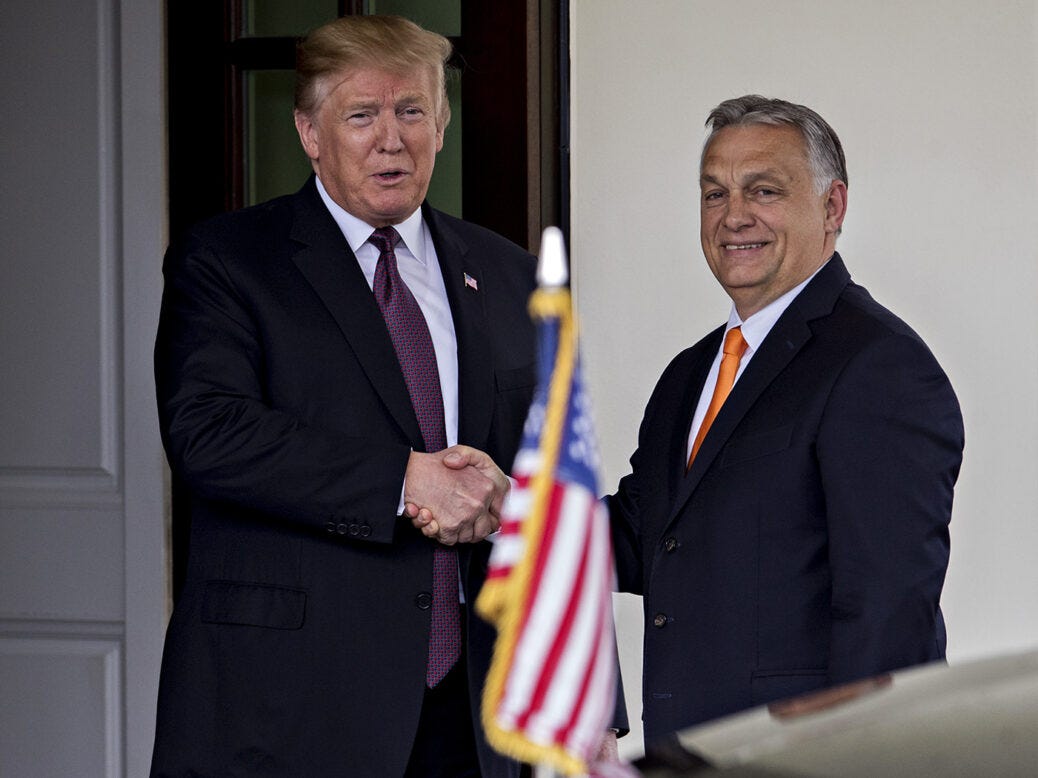Who is Viktor Orbán -- And Why Does the American Right Love Him?
When Hungarian Prime Minister Viktor Orbán visited Mar-a-Lago last year, he posted photos with Donald Trump and Elon Musk, captioning them: "The future has begun!" Few Americans might recognize this European leader, but for the American right, Orbán has become something of a political cult hero.
Orbán has dominated Hungarian politics for over a decade, serving as prime minister since 2010 (and previously from 1998 to 2002). Originally a liberal anti-communist activist, he dramatically transformed into a right-wing nationalist whose “illiberal democracy” model – one that maintains the appearance of democratic institutions while quietly undermining them from within – has attracted admirers worldwide.
After losing power in 2002, Orbán made a critical decision – he would "never lose again," and began meticulously planning Hungary's political transformation, according to Kim Lane Scheppele, a Princeton professor who worked at Hungary's Constitutional Court in the 1990s.
This wasn't just determination; it was a battle plan. When his Fidesz party swept back to power in 2010, Orbán came armed with a comprehensive playbook for locking in control.
Within years, he had rewritten Hungary's constitution, reshaped the country's media landscape, and implemented policies that critics say have undermined the independence of courts, universities, and civil society. The European Parliament has officially declared Hungary an "electoral autocracy."
The Orbán playbook
Orbán's governance strategy follows a clear pattern that has become his signature approach. At its core is controlling the narrative. Orbán’s allies own most of Hungary's media outlets, giving him unprecedented influence over what is said and how it’s communicated. At CPAC, a conference of American conservative leaders in Budapest, Orbán didn't mince words. His advice to them: "Have your own media. It's the only way to point out the insanity of the progressive left."
Another key element of the Orbán playbook is mobilizing people against perceived enemies. Whether it's billionaire George Soros, immigrants, or LGBTQ+ ideology, Orbán's government has a rotating carousel of boogeymen threatening Hungary's Christian identity. Nothing unites people like a common enemy, and Orbán makes sure his supporters always have someone to fear.
Instead of abolishing democratic institutions outright, Orbán methodically guts them from within, stuffing every position with loyalists and rewriting rules to favor his party, maintaining the appearance of democratic structures while hollowing out their independence. This approach allows him to consolidate power without triggering the international backlash that might come from more overtly authoritarian actions.
Throughout it all, Orbán wraps himself in the mantle of saving Christian civilization from the liberal elites, progressive ideologies, and globalization. This championing of traditional values resonates with religious conservatives worldwide who feel their beliefs are under attack in increasingly secular societies.
Despite consolidating immense power, Orbán preserves enough democratic elements to still call Hungary a democracy. Elections still happen, opposition parties still exist, and some critical media outlets are allowed to operate. Yet his party consistently wins two-thirds majorities with less than 50% of the vote, thanks to the new electoral rules his government has crafted to benefit themselves.
Why American conservatives are smitten
For many on America's right, Hungary under Orbán represents a leader who has successfully pushed back against liberal influences while maintaining democratic trappings.
"Hungary is actually an incubator where experiments are done on the future of conservative policies," Orbán told the Conservative Political Action Conference (CPAC) gathering in Budapest in 2023. "Hungary is the place where we didn't just talk about defeating the progressives and liberals... we actually did it."
Hosting the U.S-based CPAC in Hungary represents perhaps the most visible symbol of the growing alliance between Orbán and American conservatives.
Under the slogan "God, Homeland, Family" and with signs declaring "No Woke Zone" at the entrance, these events serve as networking opportunities for the global right. The 2025 edition proclaimed "The Age of Patriots" had arrived, celebrating Trump's election victory and the rise of right-wing parties across Europe.
These Hungarian CPAC events deliberately limit press access, with international media outlets like The New Yorker and the Associated Press reportedly being denied credentials. The recently announced CPAC Hungary 2025 in May will feature Orbán as keynote speaker, with organizers declaring: "The forces of sovereignty, freedom and peace are slowly but surely building a majority. But the real work begins now: we must Make the West Great Again!"
This conservative agenda has made Hungary a pilgrimage site for American right-wing figures. Fox News host Tucker Carlson broadcast a week of shows from Hungary in 2021, producing a documentary that portrayed the country as a conservative paradise. He praised Hungary as "a signpost to a better way," compared to the United States.
The relationship goes beyond admiration. The Danube Institute, a Hungarian think tank funded by Orbán's government, has paid American conservatives to promote Hungary abroad. The Heritage Foundation, the organization behind Project 2025 has established a formal partnership with the institute.
Kim Lane Scheppele, who watched Orbán's rise firsthand, noted that Project 2025 resembles Orbán's own blueprint: "It wasn't called Project 2025. It might have been called Project 2010."
Vice President JD Vance has specifically praised Orbán's higher education policies, which removed "gender studies" from universities and forced the liberal-leaning Central European University to relocate to Vienna. Florida Governor Ron DeSantis implemented similar education policies, with one Orbán ally claiming Florida's controversial "Don't Say Gay" law "was in fact modeled in part on what Hungary did."
The Trump-Orbán connection
The mutual admiration between Trump and Orbán has deepened over time. Trump has called Orbán "fantastic" and declared, "There's nobody that's better, smarter, or a better leader." Orbán, meanwhile, boasted last year: "We have entered the [policy]-writing system of President Donald Trump's team."
Some of the Trump administration's early actions bear striking resemblances to Orbán's strategies. Just as Orbán used funding to bring universities to heel, Trump is using federal dollars as leverage to influence American higher education institutions. Both leaders prioritize personal loyalty in appointments to key government positions, creating administrations where allegiance to the leader often outweighs traditional qualifications.
The push to change civil service rules to remove officials deemed disloyal is another shared tactic, aimed at ensuring that the government bureaucracy aligns with the leader's vision. Both have mastered defining political opponents as unpatriotic and serving foreign interests, casting democratic opposition not as legitimate political disagreement but as a threat to national identity. They also emphasize traditional values while attacking "wokeness" and transgender issues, turning cultural grievances into powerful political weapons.
A warning or a model?
Is the U.S. importing Orbán's well-proven model for conservative governance, or the blueprint for democracy's demise? It depends entirely on where you stand.
For the MAGA crowd, Hungary is proof that conservative governance doesn't have to compromise or play nice. They see a country that has successfully pushed back the tide of progressive politics.
Critics view it as a cautionary tale of how democracies can be transformed into autocracies without a dramatic coup or revolution. A country doesn't flip from democracy to dictatorship overnight. It happens in slow motion, with election laws tweaked here, media ownership consolidated there, judges replaced bit by bit, until one day you wake up and realize the democratic furniture has been rearranged beyond recognition.
Zsuzsanna Szelényi, a Hungarian politician who helped found Orbán's party before leaving in disgust and now serves as director of the CEU Democracy Institute in Budapest, offers perhaps the most sobering assessment: "If autocratization starts, it goes on like a snowball. It's not something that stops — it's a process."
Orbán's influence on American politics continues to grow. As Trump's second term unfolds, Orbán's playbook may prove increasingly relevant to understanding America's political future.








After reading about Orbán's playbook and its influence on American politics, it's natural to feel concerned. I’m really concerned. But as a student of history, I want to remind fellow readers: We have weathered worse storms as a nation and emerged stronger.
Consider what our democracy has already survived: A Civil War that literally tore the country apart, followed by the assassination of a president. The Gilded Age's rampant corruption and monopolistic control of government. Jim Crow laws and widespread disenfranchisement. McCarthyism and the suspension of civil liberties.
After each crisis, the pendulum swung back toward democratic renewal through the organized efforts of ordinary Americans who refused to surrender their rights. The Progressive movement, led by journalists, labor organizers, and reform-minded politicians like Theodore Roosevelt, wrested power from Gilded Age monopolists. The Civil Rights movement, built through grassroots organizing in churches and communities, dismantled Jim Crow's legal framework. Groups like the American Civil Liberties Union defended free speech during McCarthy's witch hunts and created legal precedents that became settled law via the Supreme Court. If you're feeling disheartened, I'd suggest reading about these movements—not just their victories, but how they organized despite seemingly insurmountable odds. Their stories aren't just inspiring, though. They're instruction manuals for democratic renewal that prove we've overcome challenges more daunting than what we face today.
The pendulum always swings back—but we don't have to wait passively for it to happen. In fact, history shows that pendulum swings occur only because everyday citizens organized and pushed for change.
Remember that the architects of Project 2025 and those adapting Orbán's methods are not superhuman geniuses. They're simply organized and focused. The difference between their effectiveness and ours comes down to coordination and clarity of purpose.
I want to be clear—I'm not an expert or someone with experience in organizing political movements. I'm just a concerned citizen like many of you. But I am aware of powerful technological tools that weren't available during those previous crises that could help us avoid Hungary's fate. Tools that can amplify voices, coordinate action, and spread information faster than the forces trying to control the narrative.
My goal is to make these tools accessible to average concerned citizens like us and then let them do the work. We don't need to be political strategists or constitutional scholars to make a difference. We just need to be organized, determined, and willing to use the advantages available to us.
If you're interested in learning more or sharing your own ideas, please reach out to me. Who knows, it might even be fun. Snacks will be provided (if you provide them ☺️).
The part that breaks my heart the most is “we didn’t just talk about defeating liberals - we actually did it.” And I’m not heartbroken because I lean liberal, I’m heartbroken that so many believe new and different ideas must be defeated, quashed, humiliated. Freedom doesn’t exist without diversity of thought. What a devastating thought-process these Right-wing “leaders” have.